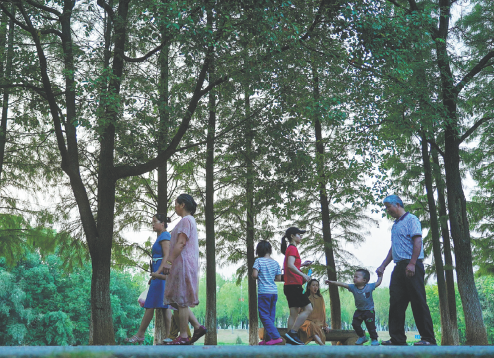Forest cities boosting eco-protection, incomes


Zou Jinlian spends her days patrolling the banks of Aixi Lake in Nanchang, capital of the eastern province of Jiangxi. As director of the protection center for migratory birds at the Aixi Lake Forest Wetland Park, the 31-year-old has an eye-catching work partner-a swan named Dabai, or "Big White".
Lying in the heart of Nanchang, the 467-hectare park is a wonderland for migratory birds.
It is home to about 2,000 birds including wild geese, egrets and swans. Although wild, Dabai also seems to enjoy the conditions, as she arrived as a migrant in 2017, but has never left.
Before the park was built, Aixi Lake was surrounded by villages. The area was targeted by real estate developers because of its great commercial potential, according to Yang Funing, chief engineer of the Nanchang Forestry and Grassland Administration.
Instead, the local government decided to move the villages and build a wetland park with the aim of improving the environment to benefit both humans and wildlife.
"People really want a better environment rather than more residential apartments," Yang said.
Construction of the wetland park started in 2007, with investment of more than 70 million yuan ($9.96 million). Gardeners tend to the plants and ensure they are protected, while the designers included zones for various activities, including camping and reading, so the wildlife would not be disturbed or harmed.
To suit the needs of the different wild species, the facility is divided into several mini theme parks, including separate areas for cranes and swans, lotus and wintersweet shrubs. To better protect the birds' habitats, their sections are isolated from areas of human activity.
Since 2014, some migratory birds have made the park their long-term habitat, according to Zou. Before that, the lake was just a place where the birds rested briefly and recuperated before continuing their long journeys, she said.
Zou is always happy to help newborns and their parents settle into a new habitat when the breeding season arrives in June and July. "Female swans lay their eggs in our center during the breeding season. This year's cygnets are the sixth generation to be born in the park from the same group," she said.
The wetland park has also seen a surge in visitor numbers, and a canteen located in the wild birds' protection center is open to the public at weekends.
"It provides a great opportunity for people to interact closely with the wildlife. That plays an important role in educating visitors about ecological conservation, especially children and teenagers," Zou said.
"In recent years, we've received several phone calls from local residents who have rescued wild birds. It shows people's growing awareness of wildlife protection, which is very encouraging."
- Macao thrives as collaboration deepens
- Beijing reiterates strong opposition to US arms sales to Taiwan
- Attack in Taipei injures 9, including 4 in critical condition: local media
- Ministry to launch month-long program aimed at promoting youth employment
- National health body asks consumers to read nutritional information on food labels
- China's top cyberspace regulator launches drive against capital market misinformation




































